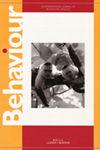When the penny drops: sharks outsmart cichlids in serial reversal learning
IF 1
4区 生物学
Q4 BEHAVIORAL SCIENCES
引用次数: 0
Abstract
Abstract Two species of fish were tested in a serial reversal learning task using two dimensional objects varying in colour and/or form. After reaching the learning criterion (LC) in the original discrimination task, individuals reversed for up to ten times, i.e., stimulus association was switched and animals rewarded for choosing the stimulus that had not been rewarded in the previous learning phase. This was conducted using the two stimuli green diamond (S+) vs. red square (S−) for the training of eight cichlids, and black star (S+) vs. black circle (S−) for the training of seven bamboo sharks. All fifteen animals completed the initial training phase and reversed successfully at least three times, indicating an ability to forsake a previously learned stimulus association in favour of a new one. Sharks, but not cichlids, also showed a decrease in the number of sessions needed to reach LC with an increase in the number of reversals conducted, showing that some sort of learning strategy, i.e., rule learning, had been applied. Animals that improve their performance within such learning paradigms are considered to possess more behavioural flexibility and advanced cognitive abilities than those who do not. More flexibility could specifically aid species living in complex habitats, social groups and subjected to changing environmental conditions.当事情发生时:鲨鱼在一系列逆向学习中胜过了慈鲷
摘要:我们对两种鱼类进行了一系列的反向学习任务测试,实验使用了不同颜色和/或形状的二维物体。在达到原辨别任务的学习标准(LC)后,个体会进行多达10次的逆转,即刺激关联发生切换,动物会因为选择了在前一学习阶段没有得到奖励的刺激而获得奖励。这是用两种刺激进行的,绿菱形(S+) vs红方框(S−)用于训练8只鲷鱼,黑星形(S+) vs黑圆圈(S−)用于训练7只竹鲨。所有十五只动物都完成了最初的训练阶段,并成功地逆转了至少三次,这表明它们有能力放弃先前习得的刺激联想,转而接受新的刺激。鲨鱼,而不是慈鲷,也显示出达到LC所需的会话次数减少,而进行的逆转次数增加,这表明某种学习策略,即规则学习,已经被应用。在这种学习模式下提高表现的动物被认为比那些没有这样做的动物拥有更多的行为灵活性和先进的认知能力。更大的灵活性可以特别帮助那些生活在复杂栖息地、社会群体和受不断变化的环境条件影响的物种。
本文章由计算机程序翻译,如有差异,请以英文原文为准。
求助全文
约1分钟内获得全文
求助全文
来源期刊

Behaviour
生物-动物学
CiteScore
1.80
自引率
7.70%
发文量
44
审稿时长
3 months
期刊介绍:
Behaviour is interested in all aspects of animal (including human) behaviour, from ecology and physiology to learning, cognition, and neuroscience. Evolutionary approaches, which concern themselves with the advantages of behaviour or capacities for the organism and its reproduction, receive much attention both at a theoretical level and as it relates to specific behavior.
 求助内容:
求助内容: 应助结果提醒方式:
应助结果提醒方式:


